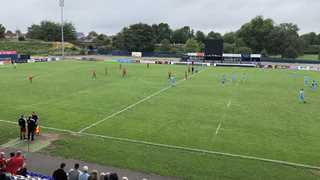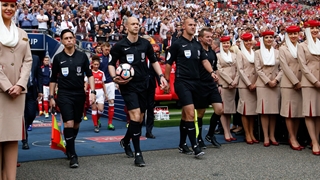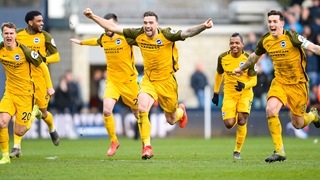
With the Emirates FA Cup semi-finals coming up, hear from our director of professional game relations, Andy Ambler, to discussa number of topics around this season's competition.
We’re nearing the end of another FA Cup campaign – what has been the highlight for you this season?
It’s been another memorable and exciting season for the FA Cup. Each season, I try to go to as many rounds of the competition as I can – in the early rounds, there’s a game literally within a few miles of everywhere in the country. That’s the beauty of the competition. I remember going to Desborough Town v Kempton Rovers in August. The game was watched by about 80 fans, but obviously meant so much to both teams. I also went Metropolitan Police v Newport, Maidstone United v Oldham Athletic and Barnet v Brentford in the fourth round, which was an exceptional game of football. It gives me as much pleasure going to the early games as it does having the privilege to watch the Cup Final at Wembley.
The FA doubled the competition’s prize fund this season. How did this come about?
Our new international broadcast deal came into effect this season, and as a result we were delighted to have been able to double the competition’s prize fund from £15.1m to £30.2m.
The impact this has had on clubs all the way down the football pyramid has been huge. You only have to go to games and listen to officials and fans to know how well it’s been received and how much of a difference it can make, especially to the clubs in the earlier rounds of the competition. Non-League clubs received around £4.5m from the prize fund this year; the hope is that a lot of that money sees its way through to facilities and ground improvements, and can offer some real financial stability. Lincoln City is a fantastic example in terms of that, building themselves a brand new elite training facility on the back of their cup run two seasons ago. And after two good seasons in the competition, Newport County have made almost £2m. It’d be nice to think that this can allow them the stability to drive the club forward.
More broadly, the international broadcast deal has really elevated the competition’s position globally. We are now taking the competition to even bigger audiences and enabling more people around the world to watch and enjoy it than ever before – whether that be on television, or via the in-game clips offered to fans in more than ten worldwide markets thanks to our new partnership with Twitter.
What other changes have we seen this season, and will we see any others next season?
We took the decision this season to remove fifth round replays from the competition. It’s not something we thought we would have to do at the start of the season, but it was a necessary move if we’re going to continue to support the success of our teams in Europe. It’s vital that we continue with fourth round replays, which are a real revenue generator for clubs, but with the issues we have around fixture congestions both domestically and internationally, this was a decision we felt we had to make. It’s a question of reacting to the world at large and what’s going on in terms of other competition formats. It’s our responsibility to make sure we keep the FA Cup relevant and ensure we balance it with other competitions which are equally as important to other clubs.
This season, following an agreement between The FA and the EFL, we also saw the launch of the Emirates FA Cup Progress Prize. The prize sees £250,000 awarded to the last club standing from each EFL division, with funds split should more than one club goes out at the same stage. When you look at the run that Newport County had, not only did they receive a significant amount of prize money and broadcast fees, they also received an additional £250,000 for being the last league EFL League Two club left in the competition. Equally, if you look at the next league up, Doncaster and AFC Wimbledon split the prize and received £125,000 each for making it to the fifth round of the competition. The potential of an additional financial benefit has been well received, and it’s something we plan to continue with for seasons to come.
Looking ahead to next season, I don’t foresee any major changes in terms of format. One thing I would like to consider and consult with fan groups on is the idea of removing extra-time after a replay, as the EFL have done this year. I think extra-time is definitely relevant in the fifth round, when you only have one fixture, but I wonder if the tie should just go straight to penalties if the score is level after a replay. That’s something for the clubs to have a view on, for the fans to have a view on, and would ultimately need to be considered by the FA Cup Committee and the FA Board. But, generally speaking, I think the competition format that we’ve got now is the right one.
Looking ahead to the semi-finals, what’s the key information and how are these decisions made?
Manchester City will play Brighton & Hove Albion at 5.30pm on Saturday 6 April and Watford will take on Wolverhampton Wanderers at 4pm on Sunday 7 April. The semi-finals are shared by our host broadcasters BBC and BT Sport, with BBC making the first pick and selecting to show Manchester City v Brighton & Hove Albion on BBC One. Watford v Wolverhampton Wanderers will be broadcast on BT Sport 2.
Each of the four clubs will be allocated approximately 33,000 tickets for their own supporters, meaning fans of both clubs in a tie receive around 75% of the stadium’s allocation. The remaining tickets will go to the football family – made up of key stakeholders, County FAs and people who have volunteered or worked tirelessly in football communities up and down the country – as well as our Club Wembley members.
Stadium ends are allocated to each club in close consultation with the local transport and police authorities. Over the semi-final weekend, Manchester City and Wolverhampton Wanderers will be in the east end of the stadium, whilst Brighton & Hove Albion and Watford will take the west end.
This season, we had the interesting scenario of having two kit colour clashes in the semi-finals. Clubs like to rectify this as early as possible, because their fans want to know what colours they’ll be playing in and there are often considerations around merchandising for the game. The way we resolve this is via a coin toss either at the meeting we have with semi-finalist clubs here at Wembley in front of club officials, or via video at another mutually agreed time. This year, Brighton and Watford won the coin tosses and therefore won the right to play in their home kit.
And prices have been frozen for the semi-final and Final this season?
There have been no increases to ticket prices this year. We raised the prices last year for the first time in a number of years, but these have now been frozen for the next two seasons – so tickets are £30, £45, £65 and £80 for adults.
We’re also pleased that, having listened to supporters’ groups from various clubs, we’ve been able to lower the category of pricing for tickets behind the goals. The first 15 rows behind each goal will now be priced at £45 rather than £65. We know this area of the stadium is particularly popular for the clubs’ season ticket holders and it plays an important role in creating that special atmosphere at games, so we therefore wanted to ensure those seats were available at a lower price point.
VAR has been a hot topic in the competition this season. How will it be used in the semi-finals and Final?
VAR will be in operation for both semi-finals and the Final. Furthermore, alongside the PGMOL, we are trialing additional communications on VAR by using the big screens inside Wembley Stadium.
One of the main criticisms about VAR from a fan’s perspective is that it’s not always fully clear what decisions are being considered to those in the stadia.
For this weekend’s semi-finals matches, if a decision is overturned by VAR we will show the usual VAR graphics on the big screen. This will be followed by the definitive video clip that provides evidence as to why that decision was overturned. But a video clip will only be shown on the big screen if the referee’s original decision is overturned. We believe this will help provide clarity and transparency to fans inside the stadium.
The FA Cup has been at the forefront VAR testing process in England and this is the next step in its development.
Do you think the competition is in a strong position?
I think it’s stronger than it has been for a number of years. Robust attendance and broadcast figures show that – the BBC’s television coverage across the fourth round weekend for example reached almost a third of the UK’s TV watching population. There’s also the seriousness with which the clubs take it. There has been a lot of discussion about weakened sides, but once again we’re sitting here in the semi-finals with four Premier League clubs all with an interest in winning the competition for different reasons. Manchester City are going for four trophies, and for the other three Premier League sides this is a real chance of lifting silverware and securing European qualification. Lifting a trophy at Wembley Stadium, is still the pinnacle for any player, manager or fan.
Finally, what makes the competition so special to you?
The strength and depth of the Cup never ceases to amaze me, not only in terms of the 736 teams that enter it, but also the more than 10,000 players that play in it each season, the fans who go to games at home and away, and the millions who watch at home and around the world. It’s the oldest and most traditional cup competition in the world and it’s special that so many people can feel part of it. I think it offers something different from league games. When a team enters the FA Cup, whether it’s in the extra preliminary round or the first round proper, I think there’s a buzz around the fan base, around the players, around the club. It’s the possibilities the competitions provides – the fact that any team that enters can have a run and play at bigger grounds against better players and try to improve themselves. It’s that element to the competition that makes it so special.












